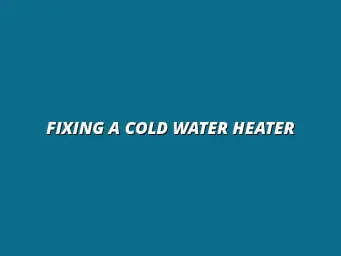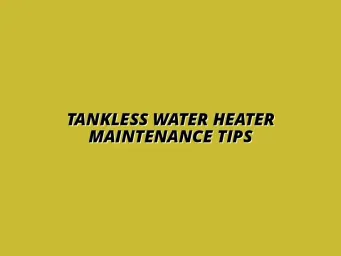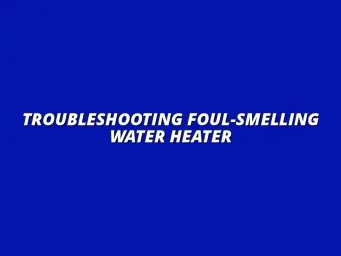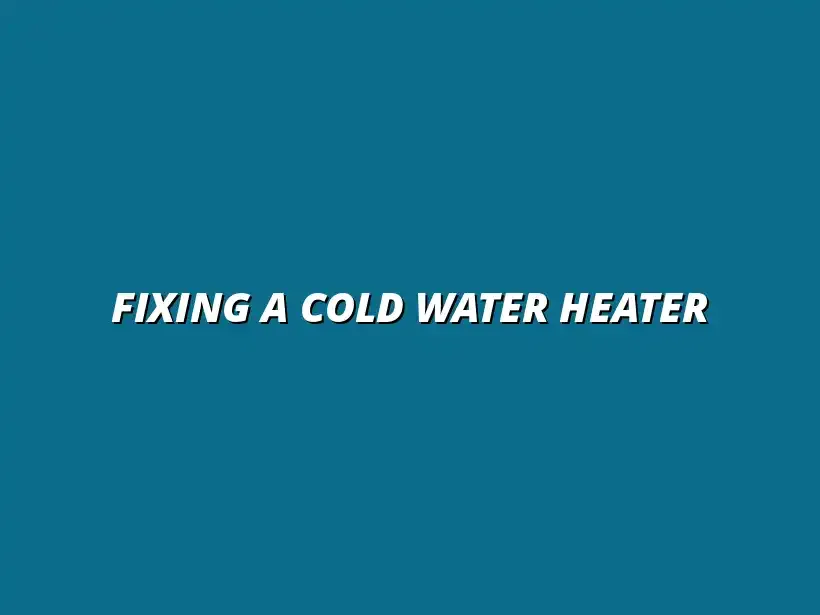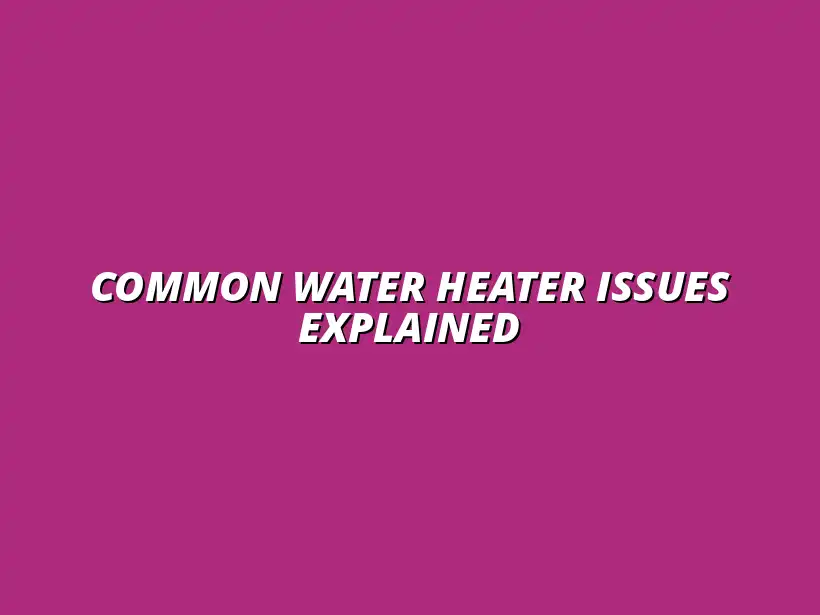
Common Water Heater Issues Explained
Understanding Water Heater Basics for Effective Troubleshooting
Water heaters are essential for our daily comfort, providing hot water for showers, washing dishes, and laundry. Understanding the different types of water heaters and how they function can make diagnosing issues easier. In this section, I’ll break down the various types of water heaters commonly found in homes, as well as the typical problems that may arise with each.
Overview of Water Heater Types and Their Functions
There are three main types of water heaters: electric, gas, and tankless. Each type has its unique features and operational methods, making them suited for different needs. Knowing these differences helps you troubleshoot issues effectively.
Electric Water Heaters: Features and Common Issues
Electric water heaters use heating elements to warm water directly and are known for their efficiency. Common issues include:
- Heating element failure: A burned-out heater element can prevent hot water production.
- Thermostat problems: If the thermostat isn’t working properly, it may not heat water to the desired temperature.
- Tripped circuit breakers: An electrical issue can stop the heater from functioning altogether.
Gas Water Heaters: Characteristics and Typical Problems
Gas water heaters rely on natural gas or propane for heating and are often more economical for larger families. However, they can encounter issues like:
- Pilot light outages: If the pilot light goes out, the heater will not function.
- Flame issues: A yellow flame indicates incomplete combustion and potential safety problems.
- Gas leaks: This is a serious issue that requires immediate professional attention.
Tankless Water Heaters: Benefits and Challenges
Tankless water heaters provide hot water on demand, which means you won’t run out during a shower. However, they can have their own challenges, such as:
- Inadequate flow rate: If too many fixtures are used simultaneously, hot water might be insufficient.
- Clogging: Mineral buildup can block the heating elements, leading to decreased efficiency.
- Higher upfront costs: Although savings on energy bills can be significant, the initial investment is typically higher.
Identifying and Diagnosing Common Water Heater Problems
Now that we have a basic understanding of the different types of water heaters, let’s dive into common problems you might face. Identifying issues can save you time and money in the long run. Below are some frequent concerns that homeowners encounter.
Insufficient Hot Water Supply: Causes and Solutions
Running out of hot water can be frustrating, especially during winter months. The root cause can often be linked to:
- Demand vs. Capacity: If your water heater cannot keep up with the household demand, it might be time to upgrade.
- Thermostat settings: If the thermostat is set too low, the water won’t get hot enough.
- Age of the unit: Older heaters may not perform as efficiently and could need replacement.
Understanding Demand vs. Capacity in Water Heaters
It’s crucial to understand the difference between demand and capacity. Demand refers to how much hot water you use at any given time, whereas capacity is the maximum amount the heater can supply. When these two factors are mismatched, you may run out of hot water more frequently.
Thermostat Issues: How They Affect Hot Water Availability
If your heater isn't producing enough hot water, checking the thermostat should be one of your first steps. A malfunctioning thermostat may not signal the heating elements effectively, leading to cold showers. Adjusting the settings or replacing the thermostat can often resolve this issue.
Water Heater Leaks: Identifying Sources and Fixes
Leaks can lead to serious water damage if not handled promptly. Identifying the source is essential in managing this issue effectively. Common leak locations include:
- Drain valve: This can become loose or damaged, causing leaks.
- Temperature and pressure relief valve: If this valve is faulty, water may leak from it.
- Tank corrosion: Older tanks can corrode over time, leading to leaks.
Temporary vs. Permanent Solutions for Water Heater Leaks
For minor leaks, temporary solutions like using a plumbing tape can help until a permanent fix is applied. However, it’s important to consult with professionals from Plumb Pro Care for a reliable and lasting solution. Regular inspections can also prevent future leaks!
Unusual Noises from Your Water Heater: What They Indicate
If you hear strange noises coming from your water heater, it can be a sign of underlying issues. Common sounds and their meanings include:
- Rumbling or popping: This often indicates sediment buildup.
- Banging: This could signal loose components within the tank.
- Hissing: This may be a sign of a leak or water escaping from a pipe.
Understanding Sediment Buildup and Its Effects
Sediment buildup occurs over time as minerals accumulate in the tank. This can cause reduced efficiency and even damage if not addressed. Flushing your water heater periodically can help eliminate this issue and extend the unit's lifespan.
Diagnosing Heating Element Issues Through Sound
Listening closely to your water heater can provide insights into possible heating element issues. If you hear unusual noises when the heater is working, it may indicate that the heating element is failing or that there’s sediment buildup affecting its performance. Regularly checking these elements can prevent more significant issues down the line!
Discolored or Foul-Smelling Water: Causes and Treatment
If your hot water is discolored or has an unpleasant odor, it could indicate contamination. Possible causes include:
- Rusty pipes: Old pipes can leach rust into your water supply.
- Bacterial growth: This can cause foul odors, especially in water heaters that are rarely used.
- Mineral deposits: These can alter the color and smell of your water.
Identifying Contaminants in Your Water Supply
Identifying the source of contamination is crucial for resolving this issue. Performing regular water quality tests can help catch problems early. If you notice ongoing issues, it may be wise to consult with plumbing professionals.
How to Flush Your Water Heater Safely and Effectively
Flushing your water heater can improve water quality and efficiency. To do this safely, follow these steps:
- Turn off the power or gas to the heater.
- Attach a garden hose to the drain valve.
- Open the drain valve and let the water flow out until it runs clear.
- Close the valve, remove the hose, and refill the tank.
It’s always a good idea to consult with professionals at Plumb Pro Care if you’re unsure about this process. With regular maintenance, you can ensure that your water heater functions properly and provides you with clean, safe water!
Common Questions About Water Heater Troubleshooting
Water heaters can sometimes be tricky, and it's normal to have questions about them! Understanding the right steps to take when your water heater fails can save you time and frustration. In this section, I’ll cover some of the most common questions homeowners often ask about troubleshooting water heater issues.
By being informed, you can tackle problems effectively or know when to call in help. Let's dive into what you need to know!
What Should You Do When Your Water Heater Fails?
When your water heater stops working, it's important to remain calm and take a few initial steps. First, you should check the power supply or gas line to see if there's a simple interruption. If everything seems fine but the heater still isn't working, it might be time to troubleshoot further.
Here are some safety precautions to keep in mind before you start troubleshooting:
- Turn off the power supply or gas to the heater to prevent accidents.
- Let the water cool before inspecting any parts to avoid burns.
- Keep the area dry to avoid electrical hazards.
When to Call a Professional for Water Heater Issues
While some issues may be simple to fix, others require expert help. If you encounter any of the following situations, it’s best to call a professional plumber:
- If the water heater is leaking significantly.
- If you notice strange noises, such as banging or rumbling.
- If the water remains cold after several troubleshooting attempts.
How to Maintain Your Water Heater to Prevent Problems
Regular maintenance can extend the life of your water heater and prevent many common issues. Establishing a maintenance routine is key! You should consider the following techniques to keep your heater running smoothly:
- Flushing the tank annually to remove sediment buildup.
- Inspecting the anode rod every few years to prevent corrosion.
- Checking the temperature setting to ensure it’s at a safe level (around 120°F is ideal).
Signs that Indicate Your Water Heater Needs Attention
Being aware of warning signs can help you catch issues before they become serious. Here are some red flags to watch for:
- Inconsistent water temperature.
- Unusual noises, such as popping or hissing.
- Water discoloration or foul smell.
Understanding Warranty and Service Considerations
Knowing what your warranty covers can save you money down the line! Most water heaters come with a warranty that typically covers the tank and specific parts for a certain period. It’s important to read the fine print to understand what is included.
What Your Water Heater Warranty Covers
Generally, water heater warranties cover:
- Repairs to the tank if it leaks.
- Replacement parts for components like heating elements.
- Labor costs for repairs during the warranty period.
Choosing the Right Service Provider for Repairs
When it comes to repairs, selecting a reliable service provider is crucial. Look for plumbers with good reviews, proper licensing, and experience. Local companies like Plumb Pro Care often offer personalized services based on their understanding of the community’s needs. Don’t hesitate to ask for recommendations!
Final Thoughts on Water Heater Troubleshooting
Having reliable hot water is essential for any home, and knowing how to troubleshoot can save you time and stress. If you keep an eye on maintenance and stay alert for warning signs, you can often catch problems before they escalate!
In conclusion, I encourage homeowners to stay informed about their water heaters. Knowledge is power, and with these tips, you’ll be better equipped to handle any issues that arise!
Recap of Key Troubleshooting Steps and Best Practices
To recap, remember these essential troubleshooting steps:
- Check power and gas supply first.
- Perform regular maintenance checks.
- Know when to call for professional help.
Essential Tips for Homeowners to Maintain Water Heaters
Here are some final tips to keep your water heater in top shape:
- Flush the tank regularly.
- Monitor temperature settings.
- Check for leaks or rust at least twice a year.
Resources for Further Learning About Water Heater Care
If you want to dive deeper into water heater care, consider checking out resources like reputable plumbing websites or local home improvement stores. They often have detailed guides and tips to help you become a water heater pro!
